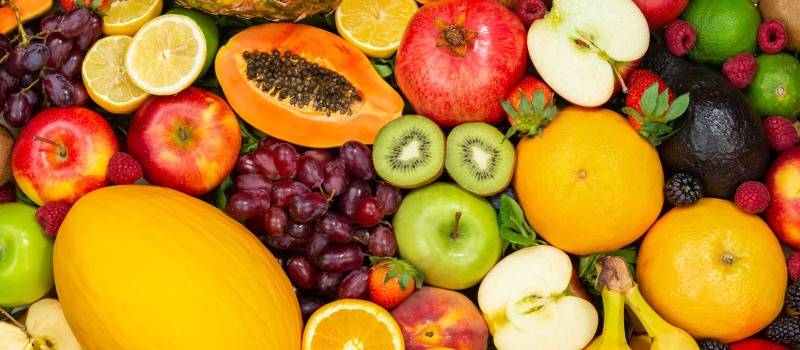Best Fruits for Everyday Healthy Life
- 7 October 2022

Fruit is among the world's most popular foods. Experts say we consume approximately one-fourth of the whole fruit every day. It's no wonder why – fruits are high in fiber, vitamin C, and antioxidants, which help protect our bodies from damage.
And while most people think of fruit when it's in season, the reality is that it's available all year long thanks to science and technology. That being said, it's important to eat the right fruit at the right time to reap the best possible benefits.
When it comes to seasonal fruit, the first thing that comes to mind is berries. In the summertime, you can practically eat them fresh off the vine. However, while strawberries are usually associated with summer, they are available year round. That's because strawberry production takes place outside of season, allowing manufacturers to provide fresh strawberries even in the dead of winter.
Grapefruit is often considered the king of fruits when it comes to offering great health benefits. While pink and red grapefruit are mostly associated with the summer season, they are also available all year round. Just like strawberries, grapefruit is also produced year round. So, wherever you are in the world, you can enjoy the taste of grapefruit whenever you want.
Winter is a great time to enjoy the vitamin-rich and fiber-rich apples. These foods offer powerful antioxidants that can help fight off disease. Eating an apple a day can help prevent cancer, heart disease, Alzheimer's disease, and more. In addition, apples also contain the beneficial substance methyl cellulose, which can help improve your mental acuity. It's commonly known that the human brain utilizes nutrients found in food to aid in thinking and remembering. So, eat your apples to remain sharp as a whip!
Fruit For All Ages
With all of the seasons and all of the variations, there's a fruit for everyone. Whether you're a child or an adult, there's a wayward fruit out there that will suit your needs. The catch is that you have to be picky about what kind of fruit you want to eat based on your age. For example, if you're a parent looking for a way to nourish your baby, you may want to avoid strawberries, raspberries, and blueberries because they're all very high in sugar. Similarly, if you're an older adult looking for a sweet treat, you may want to opt for a fruit that is lower in sugar, such as watermelon or cantaloupe.
So, as you can see, it's not one size fits all when it comes to eating fruit. The important thing is that you and your family/friend/doctor tastes and preferences play a role in your selection. And, what's more, is that the right fruit can be used for various purposes, offering you a variety of dietary options. This is important because it means you can't really go wrong no matter which fruit you choose.
Health Benefits Of Eating Fruit
Let's get down to the nitty gritty now – what exactly does fruit do for your body? Well, the answer is complex, but let's lay it out step by step.
Weight Loss
There are numerous health benefits to eating fruit, but its primary use is for weight loss. Because of its high fiber and water content, any kind of fruit can help you to feel fuller for longer. This, in turn, can help with weight loss. In a 2016 study, rats were randomly assigned to one of four groups. One group was fed a diet rich in fruit, while another group was fed sweets. After eight weeks, the rats that ate the fruit-rich diet had significantly reduced their body weight, especially when compared to the rats that ate the sugary food. The sweet tooth of rats (and people) is often used as a model for sweetness receptor activation and weight gain.
Heart Health
There's a lot more to eating fruit than weight loss and tooth decay. Fruit, especially in the form of whole fruit such as apples and pears, contain an antitoxin that prevents cancer cells from proliferating. This is why, in addition to helping with weight loss, fruit can also help to protect your heart health. The compounds in fruit, such as polyphenols and flavonoids, can reduce cholesterol and triglycerides, both of which contribute to heart disease. They can also help prevent the buildup of plaque in your arteries, ultimately saving you from heart attacks and strokes.
Brain Health
Eating fruit can also help improve your brain health. As we've established, the brain is highly influenced by nutrients found in food. This is especially true when it comes to cognitive function. One of the primary reasons why fruit and vegetables are the foods most associated with brain health is because they contain nutrients that help support the brain cells. Vitamin C, for example, is an ingredient that naturally occurs in the body. But it can also be artificially synthesized. Its presence in fruits, coupled with the action of eating fruit, helps promote nerve growth and keep your brain cells healthy and vibrant.
Immunity
Fruit is also high in antioxidants, which offer immunity-boosting benefits. Antioxidants, such as vitamins C and E, are nutrients that help protect your body from damage caused by free radicals. These are unstable molecules that can lead to cell damage and premature aging. Fruit, especially in a form high in antioxidants, can help to maintain good health by preventing free radicals from causing cellular harm. Vitamin C naturally occurs in the body, but it is also present in abundance in strawberries, blueberries, raspberries, and blackberries.
Now that you're equipped with the basics of what fruit does for your body, you may be wondering what to eat and when to eat it. Well, that's a good question. The answer depends on your body type, how active you are, and what kind of mood you're in. If you're looking to lose weight, you may want to eat the recommended five to nine servings of fruit each day. You should try to incorporate fruits into your diet as much as possible. They're tasty, portable, and help fill you up while providing important nutrients and antioxidants. What's not to like?




